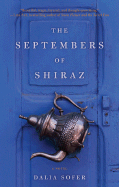

What sets Sofer apart, however, and what I didn’t expect, is that she can write. Her style is simple, sophisticated and restrained. Though her tale is a potboiler of desperate scenes, she doesn't go for melodrama. She always knows what to leave out, letting your anxiety pump the story full of adrenalin and do most of the work. She never goes poetic, never milks a scene, tells just enough.
Though the prison scenes can be harrowing, you soon find yourself in a morally gray world where even the revolutionaries have a point of view and a story--including the terrifying prison investigator, Mohsen.
The story unfolds in 47 short chapters, in Tehran, 1981, and is seen from three points of view: Isaac Amin, a 35-year-old Jewish gemologist arrested at the very beginning of the story in his jewelry shop by armed revolutionaries; his wife of 25 years, Farnaz, estranged from her husband but still in love with him, forced to face house-inspecting soldiers and office looters alone; and nine-year-old Shirin, their daughter, who discovers files in her playmate's basement that lead to the arrest of her uncle.
An alternate story, not quite as successful, takes place in Brooklyn, told from the point of view of Parviz, Isaac’s 18-year-old son, and covers his adoption by Hassidic Jews and his repressed romance with his landlord's religious daughter. The two stories don't intersect enough to be satisfying.
But the book abounds in great character moments, mistress/housekeeper confrontations, boss/employee face-offs and Isaac's terrifying interrogations by the man with the missing finger. During the last hundred pages, I read slowly, not wanting to leave the characters, worrying up to the last page that something bad would happen to my favorites.
The book's title is a nostalgic reflection on the long-ago Septembers when Isaac and Farnaz first met at college in the romantic city of Shiraz, when their love was strong and real. Sofer's novel is a melancholic and tender tale, told with elegance, judgment and discrimination.--Nick DiMartino

